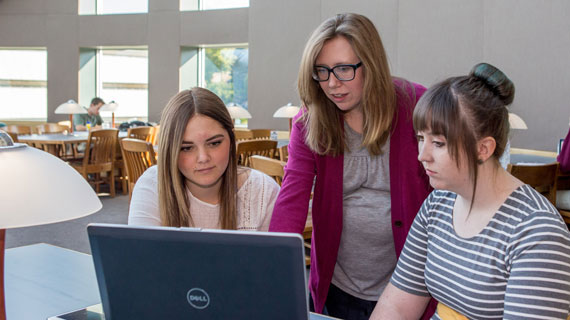6 Productivity Tips for Students
Posted: September 08, 2023 | Author: Abbie Cochrane | Read Time: 5 minutes

In the heat of exams and assignments, burnout is something that many students become familiar with. As a result, it can be difficult to muster up motivation to complete tasks as they pile up. However, there are ways to battle burnout and increase productivity during the semester. Here are six methods that students have found useful when it comes to managing responsibilities.
Organize Your Calendar
Start by looking at every responsibility on the docket; be it work, school, extracurricular or social. Come up with a color code system or another method of organization that makes sense to you that helps you arrange and prioritize tasks. You can also use the reminders app on your smartphone to nudge you throughout the day. Canvas even has a digital planner and calendar feature that you can use to create your own tasks and color-code them. Not to mention that there are many other task-organizing apps like Google Calendar, ClickUp, Clockify, and many more available for download.
If physical reminders are more beneficial, leave post-it notes around your space to help you remember a task of any importance. You can also use a physical planner as an alternative to electronic options.These can be purchased anywhere that office supplies are sold. Every week, sit down with an outline of your schedule and block out your tasks for the upcoming days–try starting with the hardest task first.
Get Rid of Distractions
Access to the internet, while a useful tool to online and in-person students alike, can also be a distraction and prevent you from focusing on your tasks. Try turning your cell phone on Do Not Disturb mode and don’t have any movies or television shows playing in the background to distract you. Music can sometimes help people focus, but if you notice that it’s distracting you, turn it off and find a quiet place to work. While study groups can be beneficial, sometimes studying on your own can be equally useful. To do this, be sure to set solid boundaries with any family members, friends, or roommates about quiet time at home and how to eliminate any potential distractions.
Don’t Overcommit
The biggest culprit of burnout and limited productivity is often due to overcommitment, whether that’s taking too many classes, social burnout, and overall overworking yourself. Make a manageable to-do list for the day. It’s unlikely that you’ll be able to get every task done in a day - this is totally normal. It’s actually healthier to spread your tasks out over several days so you’re not using up all your energy and brainpower.
Luckily, there are several ways to buffer overcommitment. Start by talking to your academic advisor before every registration session to get insight on what classes you can take that are both energetically attainable and contribute to your graduating on time. If you’re unsure about who your academic advisor is, you can check the academic advising website. Be sure to attend classes and get assignments in on time so you don’t have to worry about retaking any classes and overbooking yourself in the future. As far as work and social commitments go, make sure you’re not overworking and overwhelming yourself.
Manage Time with the Pomodoro Technique
Setting a timer can help you manage your time and not overwork yourself. Once the timer goes off, take a moment to do something you enjoy (make sure you set a timer for this too), then rotate through work and a fun activity.
If you’re not sure how long to set your timer for, try the Pomodoro technique; where you break your workload into 25-minute breakout sessions. This helps stimulate your mind with a sense of urgency, so you are likely to accomplish more in that time span. Once the 25 minutes are up, take a five-minute break to regain your brainpower, then get back to your work. Additionally, don’t try to multitask – focus on one thing at a time and rotate between tasks. Creating personal deadlines will help you refrain from procrastination and get assignments done on time.
Switch Things Up
Changing when or where you study can be a simple way to boost your productivity as a student. If you constantly find yourself being too tired to study at the end of the day, try switching things up and see what happens. Learning what your most productive hours are can help you better schedule your day and increase your productivity.
Similarly, selecting where you study can have an impact on your productivity. Studies show that completing classwork in a different location than where you would typically unwind helps your brain distinguish between when it needs to be focused and when it can relax.
Take Care of Yourself
Schedule time for yourself so you can recuperate. This includes drinking enough water, eating nutritious food, and getting enough sleep. It also goes beyond the basics and involves doing activities that are beneficial to your mental health, like taking yourself on an outing, having a chill night in with your favorite movie, or anything that helps relieve stress.
Spending time with friends can also be a form of self-care! Have a game night, go out to dinner, or just enjoy each other’s company. Remember that it’s okay to have days where the most you do is get out of bed. Taking some time for yourself each week can help rejuvenate your brain’s ability to think academically and help you succeed in your school and work environments.
Experiment with these tips to find what works best for you. Hopefully, these methods will help you increase your productivity in a healthy way, without resulting in burnout. SUU also has resources available to support your physical health and wellness, such as the Student Wellness Center and SUU CAPS. Taking advantage of these resources will help you achieve a healthy and balanced approach to your academic career.




